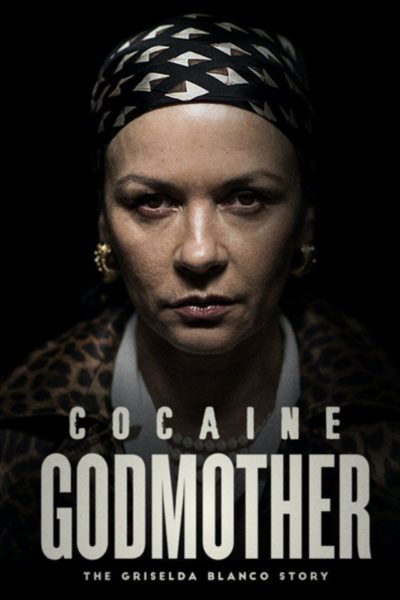★★
“The main powder here is soap, not cocaine.”
 Business is on the streets, check it out.
Business is on the streets, check it out.
Survival of the strongest they’re the ones in charge
It’s at gunpoint, it’s outside the law.
Your word is your bond and you know it, man.
How many lives have been lost to loyalty?
If you’re my partner take care you can’t fail me
Honor comes before love.
The streets are fierce because they know I’m here.
We’re the masters of this dream, All American dream
I’m brave not merciful, I’m bad to the bone
By steel, tequila and blood we’ll be the masters of paradise
Based on the above theme song, and credits which are a fast-paced montage of gun-fights, explosions and chases through the Everglades, you’d be expecting a action-packed creature that will keep the adrenaline pumping. The reality? Not so much. Indeed, just about every gun-battle in the 71 episodes here could be fitted into the opening credits. Despite this being the much-touted return of del Castillo to the genre, after her success in La Reina Del Sur, she is just one in a slew of characters, and while central, is arguably not the focus.
The title of this 2015 show translates as “Masters of Paradise”, and it occupies a not dissimilar time and place to the previous year’s Viuda Negra: Miami during the infamous cocaine wars of the late seventies and early eighties. Rather than taking some inspiration from the actual character of Griselda Blanco, this Mexican-Chilean co-production invents an entire set of fictional characters. At the core is Anastasia Cardona (del Castillo), the wife of a Mexican drug lord who is forced to flee the country after war breaks out with a rival group of traffickers.
They try to set up shop in Florida instead, which brings them to the attention some of well-established local rivals, the Quezadas, led by Leandro (Varoni). While Anastasia’s husband soon bites a bullet, the twist is, it’s not the enemy who are responsible: Anastasia herself killed him, in a fit of jealousy. Not that this stops Leandro’s chief hitman from taking the credit, or from attacking the funeral, stealing the corpse and then dropping it from a helicopter into the courtyard of his house – to make some kind of point, I guess. They follow up by kidnapping Anastasia, leaving her for dead in the swamps, and when she eventually recovers, vows to take revenge.
If this was what the show was about, it would be fine. However, it’s much more about the everyday lives of her various minions and their families, in particular, Conrado San Miguel (Zabaleta) and Adán Romero (Torre), the latter of whom is just as newly arrived in Miami. These all unfold against a backdrop of Anastasia’s quest for power and revenge, but the latter feels more like an afterthought. Think of it as similar to the way Zombieland was a road movie, that just happened to unfold against a backdrop of the zombie apocalypse. So this is a soap opera, that just happens to unfold against a backdrop of drug dealing and vengeance.
So, we get things like Adán’s daughter having issues with a jealous classmate at her new school. Conrado’s wife, Erica, is an aspiring actress, who is lured in by a sleazy producer into material of a more, ah, “adult” nature. An interfering mother-in-law. Unwanted pregnancy. A sprinkling of sexual tension. It’s mostly generic stuff, blandly uninteresting and little more than background noise as far as drama goes – though I was amused by the first name-check of B-movie director Russ Meyer I’ve heard in a telenovela. Another problem was the Chilean co-production elements, which keeps diverting the film off to that South American country, almost inevitably at the worst possible moment, just when things are getting going in Florida.
All told, probably less than a third of this is what I’d call “the good stuff”. Much of that is down to del Castillo, who is as solid as ever, and has plenty of opportunities to deliver her trademark stare, capable of melting a hole in sheet metal. I also note the presence of Oscar-nominated actress Adriana Barraza as Anastasia’s mother, Irene Medrano, who has an entire graveyard worth of skeletons in her closet; that’s certainly a better pedigree of supporting cast than most series can boast. Other positive elements include the husband and wife “cleaners”, who have a thriving business disposing of all the dead bodies, and occasionally effective moments, such as when one character is given the news of her mother’s death, in medium-long shot, and told almost entirely in her reaction.
However, the scripting in particular seems to be remarkably sloppy. At one point, Leandro Quezada appears to be stricken with a terminal disease, but this plot-line appears to be casually discarded, almost as if it never happened. The time-frame doesn’t make a great deal of sense either: there’s a gap of seven months when Anastasia recovers from her kidnapping, during which Quezada and his clan are doing… apparently nothing, when they have a perfect opportunity to bury their enemies for good. It performs another great leap forward for the final couple of episodes as well, skipping over two years, for no clear purpose. And that ending supposedly offers a big twist, yet is incredibly obvious: while I’m usually no good at spotting these things, even I saw this one coming from a long way off.
It never quite became irritating or annoying enough for me to give serious consideration to giving up, and was, at least, relatively consistent in its tone and style throughout. My disinterest was mostly a result of the content. It feels as though the makers didn’t want to tell a story about crime and criminals, so much as bolt the elements of a traditional soap-opera onto a hot topic, seeking to exploit del Castillo’s previous work and reputation, rather than capitalizing and building on it. Definitely a disappointment.
Creator: Pablo Illanes
Star: Kate del Castillo, Miguel Varoni, Jorge Zabaleta, José María Torre
















 Nora (Carrere) and her two American friends cross the border to Tijuana for a weekend of partying. It doesn’t quite go as expected: the trio instead end up locked up in a Mexican police-station. When two cops on guard at the jail attempt to rape one of her pals, Nora grabs a gun and shoots them both dead. While this perhaps does solve the immediate problem, it obviously creates some rather heftier issues. The three women go on the run, assisted by another inmate, Juan Delgado (Gómez), who has the local knowledge they need to survive south of the border. It turns out Juan was just about to sneak across the American border, and he agrees that if they will fund the payment to the coyotes for him and his family, they can come too.
Nora (Carrere) and her two American friends cross the border to Tijuana for a weekend of partying. It doesn’t quite go as expected: the trio instead end up locked up in a Mexican police-station. When two cops on guard at the jail attempt to rape one of her pals, Nora grabs a gun and shoots them both dead. While this perhaps does solve the immediate problem, it obviously creates some rather heftier issues. The three women go on the run, assisted by another inmate, Juan Delgado (Gómez), who has the local knowledge they need to survive south of the border. It turns out Juan was just about to sneak across the American border, and he agrees that if they will fund the payment to the coyotes for him and his family, they can come too. Not to be confused with the
Not to be confused with the  In an effort to pay off gambling debts their brother Michael (Haze) has run up, sisters Leah (Eastwood) and Vee (Manning) plan and execute a bank robbery. While smart in intent – they set up a diversion, and have a cunning escape route prepared – it’s not long before the operation goes wrong. The bank’s safe does not hold anywhere near the expected haul: fortunately, the assistant manager (Franco) helpfully informs them of an undisclosed vault in the basement holding six million dollars in cash. Sending some of their gang down to the vault, The sisters can only watch on CCTV aghast, as the men are picked off by mysterious figures. For, it turns out, the bank was the site of a robbery in 1982, leading to a hostage situation that ended in multiple deaths. The ghosts of those involved are still in the basement, and opening the vault has apparently released them to take revenge.
In an effort to pay off gambling debts their brother Michael (Haze) has run up, sisters Leah (Eastwood) and Vee (Manning) plan and execute a bank robbery. While smart in intent – they set up a diversion, and have a cunning escape route prepared – it’s not long before the operation goes wrong. The bank’s safe does not hold anywhere near the expected haul: fortunately, the assistant manager (Franco) helpfully informs them of an undisclosed vault in the basement holding six million dollars in cash. Sending some of their gang down to the vault, The sisters can only watch on CCTV aghast, as the men are picked off by mysterious figures. For, it turns out, the bank was the site of a robbery in 1982, leading to a hostage situation that ended in multiple deaths. The ghosts of those involved are still in the basement, and opening the vault has apparently released them to take revenge. As we mentioned in the 2018 preview, this has had a rather tortuous journey to the screen, with Zeta-Jones inked to the part of Griselda Blanco as long ago as October 2014. That theatrical film appears to have died on the vine, but the actress’s interest clearly did not. Last May, Lifetime gave the go-ahead to a TV movie version instead, telling the life story of a character who has already
As we mentioned in the 2018 preview, this has had a rather tortuous journey to the screen, with Zeta-Jones inked to the part of Griselda Blanco as long ago as October 2014. That theatrical film appears to have died on the vine, but the actress’s interest clearly did not. Last May, Lifetime gave the go-ahead to a TV movie version instead, telling the life story of a character who has already  “A woman, if she loves a man, can give him her life.
“A woman, if she loves a man, can give him her life.  The song had previously been adapted into a 1977 film, starring Ana Luisa Peluffo and Valentín Trujillo – though the dynamic was rather different there, with the leading lady being a couple of decades older than her lover. (More than 20 years earlier, Peluffo had caused a significant scandal, when she appeared nude in 1955’s La fuerza del deseo, the first such scene in Mexican cinema) The song was also adapted into an opera in 2008, and has been acknowledged by Arturo Pérez-Reverte as a significant inspiration for
The song had previously been adapted into a 1977 film, starring Ana Luisa Peluffo and Valentín Trujillo – though the dynamic was rather different there, with the leading lady being a couple of decades older than her lover. (More than 20 years earlier, Peluffo had caused a significant scandal, when she appeared nude in 1955’s La fuerza del deseo, the first such scene in Mexican cinema) The song was also adapted into an opera in 2008, and has been acknowledged by Arturo Pérez-Reverte as a significant inspiration for 




















 Del Castillo is the undisputed queen of the action telenovela. She made her name as the original “Queen of the South” in one of the most popular entries ever,
Del Castillo is the undisputed queen of the action telenovela. She made her name as the original “Queen of the South” in one of the most popular entries ever,  Valerie Graves (Osborne) is a powder-keg in her mid-twenties, barely surviving from job to job, and troubled by violent dreams. At a party, she meets Andy Cheney, who runs a locksmith company, and who offers her an admin job there. She eventually discovers the company is a front for far more questionable business, and eagerly accepts Andy’s offer of working on that side, collecting debts and enforcing his authority on those lower down the food-chain. But when one of her missions ends up hitting too close to home, she decides she’s going to quit. Her boss doesn’t take kindly to that, and stiffs her of the final payment she needs to set up life somewhere else. Which, needless to say, does not sit too well with Valerie.
Valerie Graves (Osborne) is a powder-keg in her mid-twenties, barely surviving from job to job, and troubled by violent dreams. At a party, she meets Andy Cheney, who runs a locksmith company, and who offers her an admin job there. She eventually discovers the company is a front for far more questionable business, and eagerly accepts Andy’s offer of working on that side, collecting debts and enforcing his authority on those lower down the food-chain. But when one of her missions ends up hitting too close to home, she decides she’s going to quit. Her boss doesn’t take kindly to that, and stiffs her of the final payment she needs to set up life somewhere else. Which, needless to say, does not sit too well with Valerie.